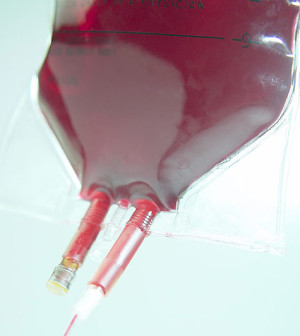- The Best Time of Day to Drink Bone Broth to Maximize Health Benefits
- 8 Ways to Increase Dopamine Naturally
- 7 Best Breads for Maintaining Stable Blood Sugar
- Gelatin vs. Collagen: Which is Best for Skin, Nails, and Joints?
- The Long-Term Effects of Daily Turmeric Supplements on Liver Health
- Could Your Grocery Store Meat Be Causing Recurring UTIs?
- Are You Making This Expensive Thermostat Error This Winter?
- Recognizing the Signs of Hypothyroidism
- 10 Strategies to Overcome Insomnia
- Could Artificial Sweeteners Be Aging the Brain Faster?
Low Blood Sugar May Affect Heartbeat in People With Diabetes


Low blood sugar levels — known as hypoglycemia — in people with diabetes may cause potentially dangerous changes in heart rate, according to a small new study.
This study’s findings may help explain why a large-scale study found that very tight control of blood sugar levels in people with type 2 diabetes led to higher-than-expected death rates. It may also help explain why some otherwise healthy people with type 1 diabetes die during their sleep — sometimes called “dead-in-bed syndrome” — without an apparent cause, researchers say.
“We found that hypoglycemia was fairly common and that nocturnal episodes in particular were generally marked by a pattern whereby glucose levels dropped to low levels for some hours during which patients slept,” said Dr. Simon Heller, senior study author and a professor of clinical diabetes and honorary consultant physician at the University of Sheffield, in England.
“These periods of hypoglycemia were associated with a high risk of marked slow heart rates [bradycardia] accompanied by [abnormal] beats. We have therefore identified a mechanism which might contribute to increased mortality in individuals with type 2 diabetes and high cardiovascular risk during intensive insulin therapy,” Heller said.
Low blood sugar levels are not uncommon in people with diabetes, a disease that can produce dangerously high blood sugar levels. That’s because the very treatments that can help prevent high blood sugar levels — and the serious complications that accompany long-term high blood sugar levels — can cause blood sugar levels to drop too low.
Although some oral diabetes medications can cause low blood sugar levels, the most common treatment to drop blood sugar levels too low is insulin. Insulin is a naturally occurring hormone that helps usher sugar into cells to be used as fuel.
“Your body needs fuel to survive and run properly,” said Dr. Simon Fisher, an associate professor of medicine, cell biology and physiology at Washington University in St. Louis. “During hypoglycemia, the body is low on energy. When hypoglycemia is more severe, the brain [which runs on sugar] can get confused and stop functioning. If the blood sugar gets low enough, hypoglycemia can be fatal.”
Fisher is also a co-author of an editorial accompanying the study in the May issue of Diabetes.
Low blood sugar is a well-recognized problem for people with type 1 diabetes, who must take multiple daily injections of insulin because their bodies no longer produce the hormone, according to study author Heller. But, low blood sugar generally isn’t considered to be as significant a problem in type 2 diabetes, noted Heller, who added that the researchers were somewhat surprised to see that people with type 2 diabetes had low blood sugar levels about 10 percent of the time.
The study included 25 people with type 2 diabetes who had a known risk of heart disease. Their average age was 64 years. They were all being treated with insulin, and had been on insulin therapy for at least four years.
All of the study volunteers were monitored with a continuous glucose monitor for five days, as well as a 12-lead Holter monitor that captured heart activity. Both of these devices are portable, which allowed the study volunteers to carry on with normal daily activities.
Overall, the researchers recorded 1,258 hours of time with normal blood sugar levels, 65 hours with high blood sugar levels and 134 hours of low blood sugar levels. Low blood sugar was defined as a blood sugar of less than 63 milligrams per deciliter. These low blood sugar levels often went unrecognized, according to the study.
The risk of a slow heart rate was eight times higher when blood sugar was low at night compared to when it was normal. Slow heart rates didn’t occur during the day, according to the study. Other types of abnormal heartbeats (arrhythmias) were also significantly higher at night when blood sugar was low compared to when blood sugar was normal. No irregular heartbeats occurred when low blood sugar symptoms were felt by the study participants.
“This study noted that spontaneous insulin-induced episodes of hypoglycemia were associated with asymptomatic mild heart arrhythmias. We have performed similar studies in animals, and noted similar arrhythmias during insulin-induced hypoglycemia,” Fisher said.
“However, in animal studies, when blood sugar became severely low, more severe abnormal cardiac rhythms — in other words, fatal heart rhythms — were noted. So, based on existing animal and human data, we speculate that severe hypoglycemia-induced arrhythmias may contribute to sudden death in patients with insulin-treated diabetes,” Fisher said.
He continued, “Nocturnal hypoglycemia is a major problem. People are less likely to wake up and treat their hypoglycemia at night. They’re less likely to appreciate the normal warning symptoms of hypoglycemia because the entire sympathetic response is relatively blunted at night.”
While the study found an association between low blood sugar levels and abnormal heart rhythms in people with type 2 diabetes, it did not prove a cause-and-effect relationship.
Another expert said the new findings highlight the dangers of hypoglycemia.
“This study suggests that the deeper the hypoglycemia, the more abnormal the heart rhythms. There seems to be some real scientific plausibility that recurrent episodes of hypoglycemia can cause abnormal disturbances of the heart. Each episode of hypoglycemia may have some element of risk,” said Dr. John Anderson, the immediate past president of the American Diabetes Association.
“It may be that tight control of blood sugar might not be as important as safe control of blood sugar. Avoiding severe hypoglycemia should be a primary goal of therapy, especially for those who have a lot of risk for heart disease. That’s why the American Diabetes Association said in 2012 that glycemic goals should be individualized. And, if you have to use insulin, avoiding those 3 a.m. hypoglycemias may be even more important,” Anderson said.
In addition to changing target blood sugar goals, Anderson and Fisher both said that the use of a continuous glucose monitor with alarms could also help people avoid low blood sugar levels in the middle of the night. “[Continuous glucose monitoring] isn’t thought of as much for the type 2 population. But, there are a lot of people with type 2 diabetes on insulin who have cardiovascular disease. This might be a prudent use of [continuous glucose monitoring],” Anderson said.
Fisher agreed, noting, “Technology — like [continuous glucose monitors] and insulin pumps — may be able to decrease the number of hypoglycemic episodes while still allowing patients to maintain tight glycemic control.”
More information
Learn more about hypoglycemia from the American Diabetes Association.
Source: HealthDay
Copyright © 2026 HealthDay. All rights reserved.










